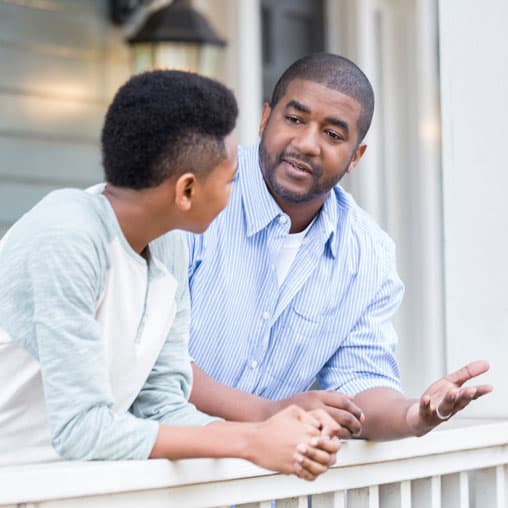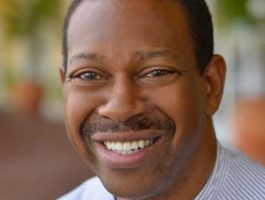
Take Our Advice – Stay in School
If you could be a teen again, what would you do differently? Gary Chapman and Clarence Shuler, authors of the book, "Choose Greatness," talk about teaching young men to seek knowledge through education, learn from other adults vs. peers, discover the truth about God, and other wise steps. Hear them discuss some of the biggest challenges teens face, like the temptation to not apply themselves or drop out of school, and the consequences of those decisions.
Show Notes
About the Guest
-
- Learn more about FamilyLife's Art of Parenting®. https://www.familylife.com/parenting/
-

Clarence Shuler
Clarence Shuler is the President/CEO of BLR: Building Lasting Relationships. Clarence is a counselor, speaker, and author of several books, including Winning the Race to Unity: Is Racial Reconciliation Really Working?, Keeping Your Wife Your Best Friend and Single and Free to Be Me. He and his wife, Brenda, live in Colorado Springs and have three adult daughters. For more information, visit clarenceshuler.com.
Gary Chapman
He has degrees from some of the most respected colleges and seminaries. He's written some of the best-selling books of the past decade and appeared on numerous radio and television programs across the country. But Dr. Gary Chapman knows more than just a lot of scholarly theories and practical advice—he knows people. He knows how to relate to people, how to have fun and how to make people laugh, all the while giving practical tools to help improve relationships.
Gary Chapman and Clarence Shuler talk about teaching young men to seek knowledge through education, learning from adults, and other wise steps. They discuss some of the biggest challenges teens face.
Take Our Advice – Stay in School
Bob: If there was a way to take a teenager ten years into the future—let them see the impact of the choices they will make during their teen years—perhaps they’d think twice about some of those choices. Dr. Gary Chapman, along with Clarence Shuler, say the best we can do as parents is point our children to the scriptures and warn them about the dangers ahead.
Gary: Clarence and I are both counselors, and through the years we have counseled many, many, many young people, young adults who made poor decisions—I mean really poor decisions—in those years, teenage years, and below the teenage years sometimes. Our heart is to try to help those younger people make decisions that will keep them from coming to our office, and also keep them out of prison and a lot of other bad experiences.
Bob: This is FamilyLife Today for Tuesday, August 6th. Our hosts are Dave and Ann Wilson, and I'm Bob Lepine. There are important conversations for parents to have with teenage sons and teenage daughters as we prepare them for adulthood. We’ll talk about some of those conversations today. Stay with us.
And welcome to FamilyLife Today. Thanks for joining us. As you think back about your teen years, if you could tell your 14-year-old self one thing that would change how you lived your teen years, do you know what that would be?
Dave: Wow.
Bob: If you could come to yourself, and say, “Hey, you’re about to go through this—just this one thing. Don’t do this, or do this instead.”
Dave: I think the first thing that comes to my mind is, “Decisions you make now are going to impact your life for a long time—if not forever.”
Bob: So, “Just think really smart about the decisions you make.”
Dave: We’ve said to our son many times, “Good choices yield good consequences, and bad choices yield bad consequences.” I made some bad decisions that I thought, “Oh, this wouldn’t last,” and it lasted.
Bob: Is there one thing you would’ve redirected your teenage self around?
Ann: The first thing that came to my mind was my peers’ opinions of me were the biggest things in my life. They really shaped who I was becoming. I wish that I would have seen the reality that those people probably wouldn’t be my friends as I became an adult.
Bob: That’s interesting because I thought very similar—how our peers influence and shape us. I think a lot of us jump quickly to areas of substances abuse or sexuality—things we’d do differently related to that—so much of that was driven by our peers’ opinion of us.
Dave: Yes, I actually—when you first asked me about it, when I was thinking I was 14—here’s my first thought: hair was way overrated. [Laughter] Oh, the hours I spent with a blow dryer!
Ann: You didn’t even need hair then.
Dave: I didn’t need it. Who needs it?
Bob: We’ve got a couple guys joining us this week. I’ll just point out that both of them have much more hair than you do. [Laughter]
Dave: That’s not much.
Bob: Dr. Gary Chapman’s joining us, along with Clarence Shuler. Men, welcome back to FamilyLife Today.
Gary and Clarence: Thanks for having us.
Bob: I’m going to ask you the same question. If you could go back and tell your 14-year-old self one thing that might have changed the trajectory of your life, do you know what the one thing would be?
Clarence: Oh, easy. I would have studied more. [Laughter] Education was not a big deal. I was able to get by. In class I was able to get by and use it in high school, get a “B.” Even when I got to Moody Bible Institute, I could pay enough attention and cram. I could usually do that.
One time God let me outsmart myself, and I forgot my exam schedule. I ended up flunking out of school and becoming homeless in Chicago. So, if I had it to do over again, I definitely would’ve studied more.
Gary: I became a Christian early on, at about the age of 10, but it was after I got in college at Moody Bible Institute that I learned how to have a personal daily devotional time with God, and how to dig into the scriptures and apply them to life. I wish I had known that a little earlier. I wish someone had come alongside me in those years and taught me how to apply scriptures to life.
Bob: The reason for the question is because of the book you two have written together, which is called Choose Greatness: 11 Wise Decisions That Brave Young Men Make. I think all of the things we targeted here, are wrapped up in these 11 decisions. You talk about teaching young men how to seek knowledge through education, so, Clarence, that covers yours. [Laughter]
You talk about seeking wisdom from parents or trusted adults. Ann, you and I were thinking about peers instead of what grownups could teach us.
Gary, you talk about discovering the truth about God as one of the wise decisions and learning how to do that as a young man.
You’ve written a book as a guidebook for young men to help them maybe navigate some of the paths ahead and not make some of the mistakes we made going through our teen years.
Dave: Exactly.
Gary: Clarence and I are both counselors, and through the years we have counseled many, many, many young people, young adults who made poor decisions—I mean really poor decisions—in those years, teenage years, and below the teenage years sometimes. Our heart is to try to help those younger people make decisions that will keep them from coming to our office, and also keep them out of prison and a lot of other bad experiences.
Bob: Clarence, as you look at young men in our culture today, a young man who’s 14, what do you think are the challenges he’s facing? What do you think are the deficits that are causing him to face his adolescent years and not be ready for them?
Clarence: I think, whether as a father or not, a lot of dads aren’t stepping in to do that. They aren’t doing a great job of providing for their sons. And the ones with single moms—they don’t have that. They don’t have that man to model for them what it’s like to be a man.
One of the things Gary and I tried to hit upon is that these young guys—they’re thinking in their now—they’re not thinking later. A friend of mine, Chalmers Lee, says you need to give children direction—young people direction—now so they have options later. That’s one of the things we try to come across.
For me, the education piece is big because education is not just about getting a grade—it’s learning. It also provides discipline.
Another thing Gary hit upon, as we wrote the book, is that it impacts your earning potential, which is huge if you want to get married and have kids. That’s a big deal, which I had no clue to when I was 14.
Bob: So, if I got the two of you together with a group of 13-year-old guys, and you were going to talk to them about school, and you said, “Look. I want you to rethink school.” What would the conversation sound like?
Gary: One of them would be, “Don’t drop out. Stay with school. The minimum is finishing high school in today’s world, so don’t even think about dropping out of high school. If you’re struggling—” and let’s face it, many have an academic background in the fifth or sixth grade where they’re not doing well. “If you don’t know how to read, let’s find somebody who can teach you how to read outside the classroom because reading is fundamental to education.”
We’re trying to take students wherever they are and say, “Don’t give up. There’s hope. There are people who will help you. You can have an education that’s going to impact the rest of your life.”
Reading is a big factor. We really emphasize reading because reading opens up the world to people, if you read. In fact, I was driving through the state of South Carolina some time ago, and there was a huge billboard that said, “Children who read live happily ever after.” I thought, “That might be an overstatement.” [Laughter] But there’s a lot of truth to that.
Dave: Clarence, you mentioned you dropped out of college—how did you learn?
Clarence: First, I learned that was not a wise decision. It could have been avoided. There were times I would stay in summer school, and I would make straight A’s. I could do it. I think God wanted to show me that I was not in control. I was abusing the gift of education and the gift of intellect He’s given me—whatever it is—and I was not using it well. That was a real big deal.
Then survival—even in my stupidity, God was gracious. There were times when I was actually homeless, but I never slept on the streets. God provided, so that was really kind of neat.
If I was talking to people, I would say, “What do you want to do? What’s your goal?” If they want to make money and be successful, then I would say, “Hey, education is the way to get there.” Even if they want to have a successful NBA or NFL career, the guys who stay in college until their junior year, do better overall than guys who go after their first year.
So, when guys think about that and, “Here’s your dream. How do you get there,” that’s another thing we try to bring to the table.
Bob: Some of this is tied to what we talked about earlier—the whole subject of perseverance and just staying after something. When I was 15 or 16 years old, I was two merit badges short of being an Eagle Scout. I was at the point where I was, “I don’t want to do these last two merit badges.” I remember my dad coming in and saying, “You know what? Do the two merit badges—power through it—do it. Get your Eagle Badge. You’ll be glad someday you did.”
That did not make sense to me. I was not glad in the moment, but I thought, “Okay, I guess I have to do this.” So, I powered through—got my last two merit badges, and I got my Eagle Scout badge. I’m so glad today.
Ann: I was going to ask. Are you glad? Was that a good decision?
Bob: I completed it. I did—
Ann: —finish it.
Bob: I finished it. When I’m talking to people today, and some guy says, “I’m an Eagle Scout,” I don’t have to say, “I had two merit badges to go, and I dropped out.” [Laughter]
Then my son, who had just finished his junior year in college—he came to me and he said, “Dad, look. I’m not getting much out of college.” He was getting good grades. He was there on scholarship. College was fine. He said, “I’ve pretty much decided what I think I want to do. I want to do farming.” He said, “These classes that I’m about to take are going to do nothing to prepare me for farming.” He said, “I’m sick of the whole thing.”
I looked at him and I said, “Just finish your senior year because of the scholarship.” [Laughter] “It’s paid for, so just do it, and someday, you’ll be glad you did.” He’s still young enough that I haven’t gone back and said, “Are you glad you did?” [Laughter] I think he knew the wisdom that just completing what you started and powering through it—that’s a part of the lesson. We’re talking about education—the value—and I’m not trying to minimize that. I’m just saying, “Look. Get to the finish line.”
Dave: You just got into their number one wise decision—listening to your parents—wisdom from your parents. There’s the parent right here—Bob Lepine, sitting there. It’s incredible wisdom.
Gary: Yes, you’re right.
Dave: Let’s talk about that a little bit. I do remember my mom—a single mom. One of her driving passions—and I married a woman with the same passion—you never quit. You just keep fighting. No matter how bleak it looks, keep going.
I remember eighth grade track. I’m not fast. I’m adequate. I’m in the 800, right? I only did it to be in shape for football in the fall, right? I ran every 800 and always got second to another guy on our team, Tom Jones. He ended up an actor. Ever heard of Tommy Lee Jones? [Laughter]
Ann: Really?
Dave: I’m kidding. Same name, but not that guy. [Laughter]
Anyway. Tom won, and I always got second. We get to the city meet, which is just three or four other middle schools. I decide, after the first lap—it’s a two-lap race—I’m going to fall down and quit. [Laughter] I’m not going to get first. I’m not going to get second because now it’s all the best in the city.
Ann: This is very embarrassing and revealing right here.
Dave: I just decided, “I hate this race. I’ve always hated this race. That second lap is the worst thing in the world.” You know, you go—we came around the first lap. We’re going right where we started, and just going to the first turn, I looked up at the turn. I can remember this! Isn’t it amazing how your memory is? It’s like ten years ago.
I looked out there, and I’m like, “Right at that turn, I’m going down. I’ll just fake an injury, and I’ll be done. I’m so glad I don’t have to finish this stupid race!” That’s what I thought. Just as we got to this turn—Tom’s out in front, and all these other runners, they all tangle up right in front of me. I can see it today. They flop down to the track—boom, boom—like five people, which shows you how far back I was. [Laughter]
All in front of me fall down. I literally jump over one of them, and I’m now in first place. I finished the race in first place.
Ann: Wow!
Dave: It’s one of those moments I remember my mom saying, “Never quit. You don’t know what’s going to happen. Never quit.” It’s a ridiculous little moment in my life, but it was confirmation—the wisdom of your mom is worth living.
Talk about that. You guys made that one of your first principles—listen to the wisdom of your parents. Why?
Clarence: My parents were—I had great parents. They were not believers initially. I got to lead them to Christ when I came home for Thanksgiving my freshman year of college. My mom worked hard, and she was in college. My dad had an eighth-grade education, working two or three jobs. They always made you finish. My sister made straight A’s, which was really a problem. [Laughter]
Ann: It was a problem for you.
Clarence: It was a problem for me. [Laughter]
I would make C’s. One day my dad said, “Look. The only job you have is going to school. I’m supplying you with food, the roof over your house—all you’ve got to do—don’t bring any more C’s into my house.” I played with it and brought home one C—he almost killed me—my mother had to pull him off me. He said, “You’re not going to be a janitor.” He spanked me. The rest of high school I brought nothing less than a B in there.
When I went to Moody, they couldn’t afford to send me a dime when I was going to Moody, so I worked close to 30-40 hours a week. I said, “This is about me. I can do what I want.” That was just the wrong attitude. I had no idea what stewardship was all about, so God began to teach me what that was all about. I did flunk out of school the end of first semester my senior year. I just was made basketball captain—I was the first African American to play basketball for Moody. I just blew it, but God was gracious. That was a tough time.
One of the first people who tried to get hold of me was Gary. I wouldn’t come home. My mom was a single mom now. She couldn’t afford to do anything with me, so I’m just trying to survive in Chicago. I remember he called—he got hold of me and called because I didn’t even want to talk to him. He said to my friend, “If he won’t talk to me on the phone, I’m coming up there.” I knew he would.
I was just really embarrassed and hurt, you know? I never thought it would happen to me. That was an education—once I got my grades up and went back to school. It made a difference, but I still had the same pattern—not studying hard—I was playing basketball—until I went to seminary. Then God just showed me the stewardship aspect. He said, “If you’re not faithful to these books, I can’t trust you with people.” That changed my whole view of things.
So, my first semester in seminary, I got a 4.0. I sent it to Gary. He said, “I always knew you had it in you, but it’s good to see it in black and white.” [Laughter]
Bob: Do you remember that conversation on the phone? You were being a dad to Clarence at that moment.
Gary: Yes. Yes. His dad was dead already. Yes, I remember that conversation. I said clearly, “You tell Clarence, if he doesn’t get on the phone, I’ll be up there tomorrow morning.” So, Clarence got on the phone. I said, “Clarence, I’m disappointed, but it’s not the end of the world. We’ll work through this. God’s going to help you.”
That’s one of the things I appreciate about Clarence. He did get up. He went to evening school, and he brought his grades up, and all of that. Later, he got involved in another college and finished his degree, and went on to seminary, and all that. He got up. He got going.
I think it’s parents—or someone who serves as a parent—that has to help young people do that.
Bob: I’m imagining a single mom or a single dad, or a father and mom sitting down with a son, and saying, “I just got this book I heard on FamilyLife Today called Choose Greatness: 11 Wise Decisions. Let’s go through these together.” The first one is “choose to seek wisdom from parents or trusted adults.” [Laughter] I can just see the kid—
Ann: —rolling his eyes.
Bob: —rolling his eyes.
Ann: Exactly.
Bob: Kind of like, “Oh, this is another one of these propaganda books that my parents have brought in.”
Ann: Especially as a single mom—how can you encourage her? How can you help her? Does she go and recruit another man in the community? What are your suggestions?
Clarence: We suggest that she go to her pastor and ask him, “Do you know any godly men who could possibly serve as a mentor for her son?” Gary and I talked about this. We hate to say it, but it’s really important too, that no matter who it is, does a background check—because of the sexual abuse today, that’s just being very prudent.
We thought the first place to go would be the pastor. We also felt that an access to the son did not give an access to the mother in regards to her feeling pressure to date this guy, or stuff like that. We thought that was really important or good first place to begin to go to.
Dave: It’s interesting. I’m sitting here today because of my mom doing that. I didn’t even know it as a young boy. I didn’t have a dad in my life after age seven. I found out years later—you know I was an athlete—so every coach I had, my mom approached, privately, and said, “I don’t know if you know, David doesn’t have a father. Could you be in this season, his.” So, I was invited over to dinners at houses, and I never understood why. Now I knew. My mom was intentional.
The thing she didn’t have—and none of them had—was this. There was no game plan. They helped me, and I think I’m sitting here today because of their influence. But what a great tool—this book—to be able to hand to a parent, to a single parent, to anybody, to say, “You want to mentor somebody? Here you go.” It’s a game plan to do it.
Gary: We’re encouraging, whenever possible, that there be a substitute adult male that will work through the book with that teenager. But if not, to the teenager, get in and go with it. If possible, find somebody who can come alongside you.
Bob: Are you coaching football right now?
Dave: I did. For 12 years. High school.
Bob: So, is this the kind—there are 11 wise decisions. How many games in a season?
Dave: If you do well, if you win the playoffs, fifteen. We did that one time. Our team won the state championship. Normally nine games, and more. I speak every week to the team. We call it chapel—in a public high school, which is awesome. This is the kind of thing you would teach every Thursday before the Friday game.
Gary: You could come in and say, “Today we’re going to talk about a wise decision you could make—”
Dave: Yes.
Gary: “—a wise decision on respecting girls and women.”
Dave: I’m laughing because it’s written for young boys and men. This is material for 32-year-old boys who shave. They think they’re men; they’re not. I’m thinking as an NFL chaplain, I would have used this with 20 and 30-year-old men no different than I would with 13-year-old boys.
Clarence: Dave, I’m so glad you said that because they were targeting 11 to 16-year- old’s; then, they went to 18-year-old’s. One of my accountability buddies said his college sons came home and saw the book and grabbed it and started reading it. Some couples I’ve been counseling said their 29-year-old friend grabbed this book. I was playing mixed doubles, and this one lady—her son’s a teaching pro in California—she got the book for him.
So, we think the principles, no matter how old you are, apply to any young man who didn’t have that.
Bob: Who didn’t have a mentor—
Clarence: Right.
Bob: —didn’t have a dad. Didn’t have somebody saying, “This is how you make sense of life. This is how you navigate it.”
If somebody follows the 11 wise decisions in here, life is going to go much better for them than if they veer off on any one or two of these, right?
Clarence: Right.
Bob: We’ve got copies of Gary’s and Clarence’s book Choose Greatness in our FamilyLife Today Resource Center. You can order the book from us online at FamilyLifeToday.com or call to order 1-800-FL-TODAY.
Again, the website FamilyLifeToday.com, or call 1-800-358-6329. That’s 1-800 “F” as in family, “L” as in life, and then the word, “TODAY.”
Let me just mention—we created a weekend getaway for dads and sons to do called Passport to Identity®. This is designed for when your kids are 14-15 years old. It prompts you to have discussions about issues of dating and identity. What does it mean that God made you a young man? What are the issues you should be focused on?
We’ve also got it for moms and daughters. Find out more about Passport to Identity, and plan a weekend away with your teenage son or daughter sometime in the next couple of months. It would be a great investment with your kids.
As we’re talking this week about raising the next generation, I’m thinking back to The Art of Parenting® video series that FamilyLife released a little over a year ago. When we released that—along with the movie Like Arrows which, by the way, is on Netflix now or available for purchase or rental on Amazon and iTunes. I think there are still DVD’s at Wal-Mart if you’re still interested in seeing the movie Like Arrows.
The Art of Parenting video series is designed to help moms and dads have the kinds of conversations with their kids that we’ve been talking about this week. Our team has a prayer goal. When we launched this, we prayed. We asked God to allow this series to impact more than one million people worldwide in the first three years the series was out.
Over the last year, we’ve seen God multiply the effect of this ministry and touch more than 350,000 people all around the world. In fact, it’s been translated into Spanish. In Central and South America, there have been more than 150,000 people who went to theaters to see Like Arrows, and who have started Art of Parenting groups. Now we’re hoping to translate into Mandarin and Arabic.
We were sharing all this with some friends of our recently, and this couple said, “We want to help accelerate, not only the work of The Art of Parenting, but all that you’re doing here at FamilyLife.” They agreed that they would make a donation of 500,000 dollars if we could get FamilyLife listeners to match that amount.
So, during the month of August, that’s our request. Would you make as generous a donation as possible, so we can continue to expand the work of FamilyLife globally through The Art of Parenting, through this radio program, through all we’re doing here at FamilyLife. Will you help make that possible when you give a donation today? Your donation will be matched dollar for dollar up to that total of 500,000 dollars.
We need to do this during August, so we’re asking you to make that donation today. Go to FamilyLifeToday.com and donate online. Or call 1-800-FL-TODAY to donate. When you do, we’d like to say thank you. We’ll send you a copy of Dennis and Barbara Rainey’s book The Art of Parenting. You can pass that on to someone you know or keep it for yourself. Again, it’s our gift for your ongoing support for the ministry of FamilyLife Today. We appreciate you.
We hope you can join us tomorrow. We’re going to hear about the moment in Dr. Gary Chapman’s life when he decided, “I don’t think I’m going to drink alcohol.” Pretty powerful story. We’ll hear about it tomorrow. Hope you can be with us for that.
I want to thank our engineer today, Keith Lynch, along with our entire broadcast production team. On behalf of our hosts, Dave and Ann Wilson, I’m Bob Lepine. We will see you back tomorrow for another edition of FamilyLife Today.
FamilyLife Today is a production of FamilyLife of Little Rock, Arkansas; a Cru® Ministry. Help for today. Hope for tomorrow.
We are so happy to provide these transcripts to you. However, there is a cost to produce them for our website. If you’ve benefited from the broadcast transcripts, would you consider donating today to help defray the costs?
Copyright © 2019 FamilyLife. All rights reserved.
1
Episodes in this Series

So What’s Wrong With…


